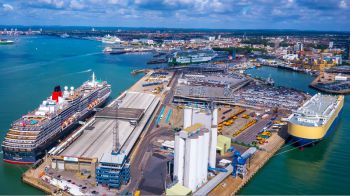Any free port in a storm: New analysis predicts limited impact of free zones for post-Brexit Britain
By: Neil Vowles
Last updated: Wednesday, 27 February 2019

Southampton port was among the first free zones to be introduced in the UK in the 1980s.
Proposals to relax customs rules and duties in specially-designated areas, known as free ports or more generally free zones, would make little impact on rebuilding the UK economy after Brexit, new analysis by the UK Trade Policy Observatory (UKTPO) at the University of Sussex has detailed.
The creation of free ports, which would give companies the ability to defer payment of taxes on imported inputs and in some circumstances even avoid them altogether, have been mooted as a way to create thousands of new jobs, rebuild the nation’s manufacturing industry and regenerate deprived areas of the country once the UK leaves the EU Single Market and Customs Union.
But analysis by University of Sussex economists Dr Ilona Serwicka and Dr Peter Holmes released today states that potential benefits and savings for businesses operating in free ports with simplified customs procedures, relief on customs duties and tariff inversion are likely to be limited in the UK.
While free ports could in some circumstances help increase export opportunities after Brexit, the academics warn that any economic benefits brought to free zones could simply be diverting economic activity from elsewhere. In the US their main impact has been to promote imports.
Dr Serwicka, Research Fellow in the Economics of Brexit at the University of Sussex, said: “While some form of free zones could help with shaping export-oriented and place-based regional development programmes, UK policymakers will need to devise measures that counteract the possible risk that economic activity will simply be diverted from elsewhere. They will also need to offer a wider set of incentives for trade and jobs while keeping within the WTO and any ‘level playing field’ obligations that arise from new agreements.”
The new UKTPO analysis questions previous research claiming free zones in the UK could generate up to 150,000 new jobs, add £9bn a year to the UK economy and narrow the North-South divide. The UKTPO team believe a smaller proportion would be genuine additional jobs and economic activity rather than just redistributed from elsewhere in the UK.
The UKTPO research notes that while free zones in the US prevent “tariff inversion” costs, where tariffs on intermediate goods exceed tariffs on finished goods, such opportunities are slight in any likely UK trade policy scenario. The new briefing also warns that free zones have costs as well as benefits.
The brief observes that to have any noticeable effect, UK trade policymakers would need to offer a wider set of incentives in addition to just free zones while warning that such incentives could be limited in scope by World Trade Organisation rules and “level playing field” obligations (state aid rules) included in a future trade agreement with the EU that the UK would be bound by.
Analysis of free zones operating within the US by the UKTPO team suggested limited evidence on their ability to create genuinely new jobs rather than just encourage companies to shift jobs from other parts of the country.
Dr Holmes, Reader in Economics at the University of Sussex, said: “The UK Government will have to be innovative and inventive if it’s to build fruitful new trading relationships as a sovereign nation outside the EU.
“Free zones alone can’t do very much to promote overall regeneration. They will need to be incorporated into a far more comprehensive plan alongside other regional incentives to revitalise areas hollowed out by de-industrialisation and in need of services jobs as well as manufacturing.”
UKTPO hosted a briefing on What is the ‘extra mileage’ in the re-introduction of free zones in the UK? on Tuesday 26 February 2019 at Chatham House in St James’s Square, London.
The briefing authors were joined by discussant Fred Perry (Deputy Director, Ministerial Strategy, Department for International Trade) and event chair Professor Jim Rollo (Deputy Director, UKTPO; Associate Fellow, Chatham House).
To read the briefing in full, visit here.
Factfile
Goods that are imported into free zones/ports do not incur usual import procedures on entry and reexit, and import duties are not payable until these goods are released for free circulation in the domestic economy (or used or consumed within the free zone).
Free zones came into operation in the UK in 1984 when areas of Birmingham, Belfast, Cardiff, Liverpool, Prestwick and Southampton were designated the UK’s first free zones. In July 2012, however, the UK stopped renewing the licenses for free zones as the Government switched its focus to enterprise zones which can offer companies a wider set of financial incentives.
Research has shown that UK enterprise zones established in the 1980s had a limited impact in terms of job creation, with up to 41 per cent of the 58,000 jobs "created" relocated from elsewhere in the UK, and were expensive, costing the public purse £17,000 per additional job created in the zone (in 1994-95 prices).
There are currently 61 enterprise zones across the UK: 48 in England, eight in Wales, and four in Scotland (called enterprise areas). Recently, Northern Ireland’s first enterprise zone – Atlantic Link Enterprise Campus – was launched in Coleraine.
Within the EU, there are currently 80 free zones located across 21 EU Member States and more than 4,300 Special Economic Zones (of which free zones are one type) may be in operation around the world, although the number is difficult to verify because no exact census exists.
